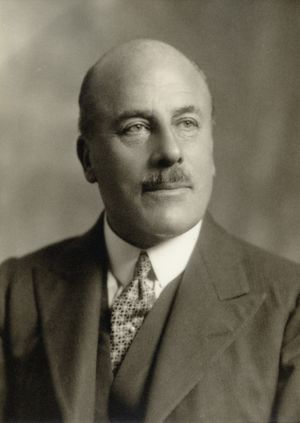George Warren Swire
| George Warren Swire | |
|---|---|
 | |
| Born |
27 May 1883 Pembroke Gardens, London |
| Died |
November 18, 1949 (aged 66) 22 Chester Terrace, Regent's Park, London |
| Cause of death | Heart Attack |
| Resting place | Leighton Buzzard, Bedfordshire |
| Parents | John Samuel Swire and Mary Warren |
Contents
Biography
George Warren Swire (1883–1949) was a prominent British businessman and influential figure in the development of the Swire Group. Born on 27 May 1883 in Pembroke Gardens, London, he was the only child of John Samuel Swire and his second wife, Mary Warren. Educated at Eton College and later in Weimar, Germany, Swire initially showed little enthusiasm for business, but in 1904 he became a partner in the family firm and gradually assumed greater responsibility.
He joined a territorial regiment, the socially prestigious Royal Bucks Hussars, in 1907, was mobilised in 1914, and sent with the regiment to Egypt the following year, before being transferred back to Britain for shipping business in 1916, where he was patently of more use. His career in the army was far from happy: “the head of JS&S is a bad place to learn subordination and obedience to incompetent fools, who aren’t even gentlemen” he wrote at the time.
In 1927 he succeeded his half-brother, John “Jack” Swire, as Chairman of John Swire & Sons, a position he held until 1946. His tenure coincided with one of the most turbulent periods in the company’s history, marked by civil war and revolution in China, the Great Depression, and the Sino-Japanese War. Despite these challenges, Swire kept the business afloat and introduced adaptive strategies, such as employing local managers in China—an innovative move at the time Swire had a particular interest in shipping, notably the China Navigation Company, which he helped restore to profitability through new shipbuilding programmes..
Beyond business, Swire was a keen amateur photographer, leaving behind an extensive visual record of China’s trade and infrastructure during the early 20th century. His photographs, now preserved in archives of the School of Oriental and African Studies (SOAS), provide invaluable historical insights. Never married his passions outside of work and photography were music, art and deer stalking at his country estate in Scotland, Glen Affaric.
George Warren Swire died on 18 November 1949, aged 66, at Chester Terrace, Regent’s Park, London, and was buried in Leighton Buzzard, Bedfordshire. Though less visionary than his successors, his resilience and pragmatism ensured the survival of the John Swire & Sons through decades of upheaval.